World Triennial Plan 2021–2024

WORLD SCOUT COMMITTEE Midterm Review Report
STRATEGY
© World Scout Bureau Inc.
STRATEGY
June 2023
World Scout Bureau
Global Support Centre Kuala Lumpur
Suite 3, Level 17
Menara Sentral Vista
150 Jalan Sultan Abdul Samad Brickfields
50470 Kuala Lumpur, MALAYSIA
Tel.: + 60 3 2276 9000
Fax: + 60 3 2276 9089
worldbureau@scout.org scout.org
Reproduction is authorised to National Scout Organizations and Associations which are members of the World Organization of the Scout Movement. Credit for the source must be given.
Photos by: Bulent Bay, Bassem Bouchaala, Ronald de Beer, Czech Scouts, Dominic Bruegger, Tily eto Madagasikara, George Hernandez, Nicolas Mercier, Jean-Pierre Pouteau, Andy Rajotiana, Jan Thoma, Victor Ortega, Jonas Westblom.
WORLD SCOUT COMMITTEE Midterm Review Report
World Triennial Plan 2021–2024

4 WORLD SCOUT COMMITTEE Midterm Review Report World Triennial Plan 2021 – 2024
TABLE OF CONTENTS

5 WORLD SCOUT COMMITTEE Midterm Review Report World Triennial Plan 2021 – 2024 Foreword 6 Executive summary 8 Operational Framework of the Triennial Plan 2021-2024 12 Progress of Vision 2023 (Meta-Indicators) 14 Progress of the World Triennial Plan 2021-2024 Educational Methods Workstream 18 World Events Workstream 26 Communications and Partnerships Workstream 30 Good Governance Workstream 36 Youth Engagement in Decision-Making Task Force 46 Sustainability Task Force 49 Next Strategy for Scouting 50 World Scout Committee Working Groups 52
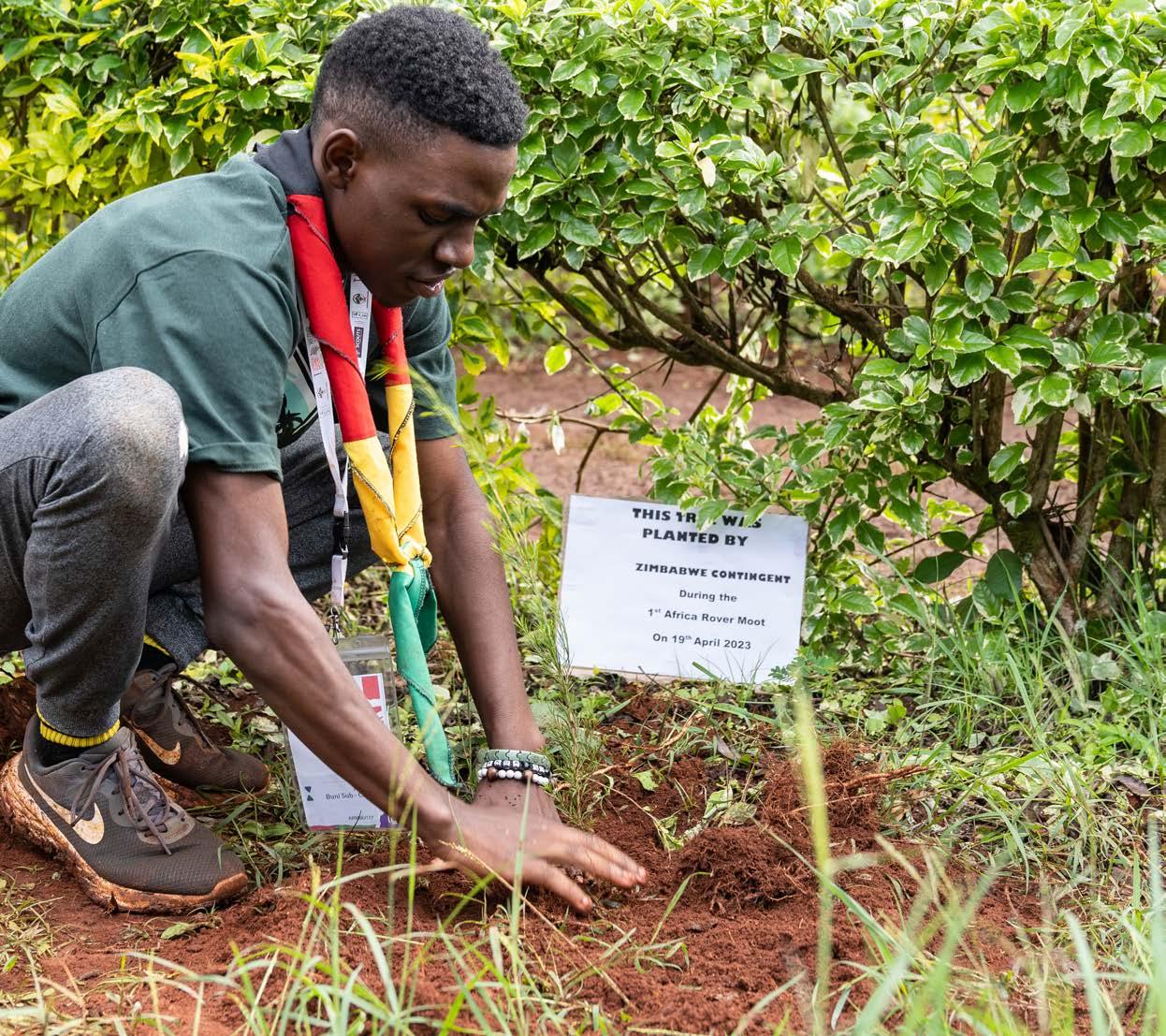
6 WORLD SCOUT COMMITTEE Midterm Review Report World Triennial Plan 2021 – 2024
FOREWORD
Dear friends,

With this report, we are pleased to share this midterm update on the delivery of the World Triennial Plan 2021-2024 and our Strategy for Scouting (Vision 2023) which highlights the significant progress we have made in achieving our strategic objectives since the 42nd World Scout Conference.
With a focus on recovery, sustainability and impact following the COVID-19 pandemic, we are on track with a majority of our key performance indicators, with a good number of them already achieved. While there is still work to be done specifically in the areas of growth, Safe from Harm, and diversity and inclusion, the midterm review demonstrates the remarkable resilience, dedication, and innovative spirit of our global Scouting community.
This triennium, we remain steadfastly committed to supporting NSOs in their membership recovery, retention and growth efforts by expanding the WOSM Service area of growth, and training new consultants to accelerate progress towards this goal. We are also continuing to make Safe from Harm our highest priority by developing a new SelfAssessment Tool and measures of support through WOSM Services to enable National Scout Organizations (NSOs) to improve their child and youth safeguarding efforts, and meet the Safe from Harm requirements for WOSM membership.
We are also working to enhance youth engagement and involvement in decision-making at all levels of Scouting, and continue to promote diversity and inclusion as a cornerstone towards becoming a more inclusive and accessible Movement for all. In addition, through participation in international events, such as UN Climate Change Conference and UN General Assembly, Scouts are advocating on behalf millions worldwide for a more peaceful, just and sustainable future.
As we celebrate the successes of Vision 2023, and embark on a journey to develop the next Strategy for Scouting, which will serve as a guiding light for the Movement over the next decade, there is good reason to be incredibly hopeful about the direction and impact of Scouting worldwide.
We look forward to working together to realise the ambitions of the World Triennial Plan, and reporting on the outcomes of this Triennium at the 43rd World Scout Conference in Egypt next year.

Yours in Scouting,
 Ahmad Alhendawi Secretary General, WOSM
Ahmad Alhendawi Secretary General, WOSM
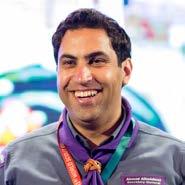
7 WORLD SCOUT COMMITTEE Midterm Review Report World Triennial Plan 2021 – 2024
Andy Chapman Chairperson, World Scout Committee
EXECUTIVE SUMMARY
This midterm review report provides an overview of the progress made across our Movement at the mid-point of the World Triennial Plan 2021-2024, as well as the last triennium of the current Strategy for Scouting (Vision 2023). This report has been developed using a variety of information sources, including global census data, WOSM Services data, Global Support Assessment Tool (GSAT) data, surveys with NSOs on key topics, as well as the general survey to NSOs conducted between March and August 2022.
The results of this report serve as a benchmark for how we are progressing towards achieving the World Triennial Plan objectives by the end of the triennium, and provide insight into the ongoing work of the World Scout Committee requested through the Resolutions of the 2021 World Scout Conference.

Half-way through the Triennium, 15 of the 21 key performance indicators that were measured for the midterm review are or on track with five of them already achieved. Despite the lingering impacts of the COVID-19 pandemic, the midterm review of the key performance indicators suggests that we are making good progress across WOSM’s six strategic priorities, as well as the key themes for this Triennium outlined in the following section.
In addition, WOSM Services has continued to transform the way we operate as a global Movement by providing innovative capacity strengthening services and support to our membership of 173 NSOs across 13 service areas. We have delivered 189 services since the start of the Triennium reaching nearly 85% of NSOs.
8 WORLD SCOUT COMMITTEE Midterm Review Report World Triennial Plan 2021 – 2024
Growth and Pandemic Recovery
During the first half of the triennium, our efforts focused on supporting NSOs to recover from the COVID-19 pandemic and strengthen their financial resilience. We developed resources and trained consultants in good governance, and to improve the financial management and resilience of Member Organizations. In the area of educational methods, we worked to support NSOs to modernise their Youth Programmes, and implement the Scouts for SDGs educational initiatives as a complementary offering to their Youth Programmes.
However, the midterm review revealed that the impact of the pandemic on membership growth still persists. Many NSOs reported only modest growth or remaining decline in membership. While there are early signs of post-pandemic recovery in the 2021 census data, only a limited number of NSOs have fully regained their pre-pandemic membership levels.
To address these realities, we have worked to expand the WOSM Service offerings in the area of growth, and to strengthen the capacities of new and existing growth consultants. By providing support, fostering collaboration and encouraging peer-to-peer learning between NSOs, we aim to continue to support Member Organizations to reach their growth potential as one of our Movement’s highest priorities.
Safe from Harm

Another major priority has been to support NSOs to implement Safe from Harm policies, programmes and good practices. We developed a SelfAssessment Tool and framework to help NSOs implement the World Safe from Harm Policy, and meet the Safe from Harm requirements for membership outlined in the WOSM Constitution. We also developed a mechanism to monitor the World Safe from Harm Policy’s implementation among NSOs, building on the success and structure of GSAT and now integrated into the annual reporting process.
Moving forward, our focus will be to support NSOs to use the Self-Assessment Tool to identify opportunities to strengthen child and youth safeguarding, and access support through WOSM Services in the area of Safe from Harm. Additionally, new guidelines on how to integrate Safe from Harm measures into World and Regional events have been developed, helping to create a safe and inclusive environment for all participants at Scouting events, including the upcoming 25th World Scout Jamboree and 4th World Scout Education Congress.
Youth Engagement
Significant efforts have been made at this point in the triennium to enhance youth engagement in decision-making at all levels of Scouting. The task force on youth engagement focused on identifying institutional, structural and cultural barriers to meaningful youth participation, as well as opportunities to overcome these barriers following the updated Youth Engagement Strategy approved by the 2021 World Scout Conference. The task force also proposed measures to further strengthen representation and participation of young people in the World Scout Committee in the upcoming triennium.
9 WORLD SCOUT COMMITTEE Midterm Review Report World Triennial Plan 2021 – 2024
Looking ahead, the focus on youth engagement will involve strengthening and replicating best practice for youth leadership trainings and frameworks around the world, as well as providing learning opportunities and networking platforms in Scouting Regions. Additionally, a review of the World Youth Programme and World Youth Involvement Policies is slated to be concluded this triennium.
Diversity and Inclusion
WOSM has also been actively working to promote diversity, inclusion and gender equality across the Scout Movement. A project as part of the Operational Framework is focused on assessing the current state of diversity and inclusion across our membership, including identifying existing barriers, trends and areas for improvement. Diversity and inclusion remains a key priority for us this triennium, with more work to be done to achieve the Triennial Plan’s objectives and improve gender balance among NSO leadership at all levels.

Various initiatives have been implemented to mainstream diversity and inclusion into our work, including global campaigns during international days of action, and incorporating these topics into sessions during World and Regional Scouting events, including workshops at the AsiaPacific and Arab Scout Regional Conferences, and regional trainings such as the Interamerica virtual regional workshop on diversity and inclusion.
Looking ahead, we will conduct a series of dialogues and workshops with the good governance, Youth Programme, Adults in Scouting, humanitarian action, and Safe from Harm teams to ensure that diversity and inclusion is mainstreamed across all areas of our work, and we are aligned around a vision to make Scouting more inclusive and accessible to all.
Positioning Scouting
Since the beginning of the triennium, Scouts have actively engaged in voicing their opinions, advocating for important causes, and establishing new partnerships to support the implementation of the World Triennial Plan. A new group of Youth Representatives was appointed to represent youth-led advocacy efforts in six key areas: peace, environment, education, Sustainable Development Goals (SDGs), gender and human rights. Notable advocacy initiatives included sending WOSM and NSO delegations to COP26 and COP27, as well as participating in the Transforming Education Summit at the UN General Assembly, ensuring a strong presence and influence to position us at the world’s leading educational youth Movement.
In terms of social impact, we are working to expand the reach of the social impact project in collaboration with the European Scout Region and extend its availability to more NSOs worldwide. Through funding from various institutions and support from academia, the project aims to establish a comprehensive social impact service within WOSM Service offerings by the end of the Triennium.
10 WORLD SCOUT COMMITTEE Midterm Review Report World Triennial Plan 2021 – 2024
Sustainability
Another key focus for us this triennium is to empower young people and volunteers to be environmental leaders in the fight against climate change. Our Task Force on Sustainability conducted a first study to assess the impact of WOSM’s operations on the climate, and with those insights developed a climate impact strategy which outlines our approach to reducing and offsetting carbon emissions.
We also continued to advance our environmental work by further implementing the Earth Tribe initiative among NSOs, engaging young people in the Earth Hour campaign together with WWF, and supporting Scout Centres of Excellence for Nature, Environment and Sustainability (SCENES) to strengthen environment education at the national level. We also worked on enhancing the sustainability of World Scout events by developing guidelines on sustainability, and strengthened the criteria in the updated version of GSAT by introducing two new measurements on sustainability.
Governance
During this triennium, we made significant efforts to provide support to NSOs in the area of good governance and improve decision-making processes within WOSM. A new Learning Zone library and system to gather feedback on WOSM resources and monitor their usage has been implemented, allowing us to adopt a data-driven approach to developing more impactful support to NSOs. We have also reviewed and updated the GSAT standard which will be launched with a new digital tool in the coming period. Finally, we have supported decision-making in WOSM by conducting induction sessions with members of the World and Regional Scout Committees to support their governance, develop working methods, and align on strategic priorities.
To align with international best practices in good governance, WOSM became a member of Accountably Now, which involves undertaking external reviews to assess transparency, accountability, and governance practices. For the rest of the triennium, our focus will be on encouraging NSOs to share knowledge and best practices in good governance, and access support and resources through WOSM Services to enhance their operations.
Strategy for Scouting
To track the progress towards our nineyear Strategy for Scouting (Vision 2023) a set of 16 meta indicators in four groups — influence, growth, impact, and unity — was developed in 2014. The latest assessment of the Vision 2023 meta indicators suggested good progress with 11 out of 18 having been achieved with an average implementation rate of 84%.
As our current Strategy for Scouting will come to an end by the 2024 World Scout Conference, the World Scout Committee tasked a Strategy Group to facilitate a participatory process in the development a new Strategy for Scouting. This process is now well underway and has so far completed a significant research on youth and societal trends for the future, as well as an analysis of the situation of the Scout Movement and the impact of Vision 2023. Following a collaborative prioritisation workshop in May 2023 with over 60 participants from NSOs and WOSM structures, a first draft of the new Strategy for Scouting is expected to be shared in July 2023 for a broad validation process with all NSOs and WOSM stakeholders.
Overall we are well on track to achieve the objectives of the World Triennial Plan, and remain committed to working together with NSO leadership, and our global Movement of 57 million Scouts, to achieve the ambitions of our current Strategy for Scouting, and set us on a clear path for even greater impact for the future.
11 WORLD SCOUT COMMITTEE Midterm Review Report World Triennial Plan 2021 – 2024
OPERATIONAL FRAMEWORK OF THE WORLD TRIENNIAL PLAN 2021-2024
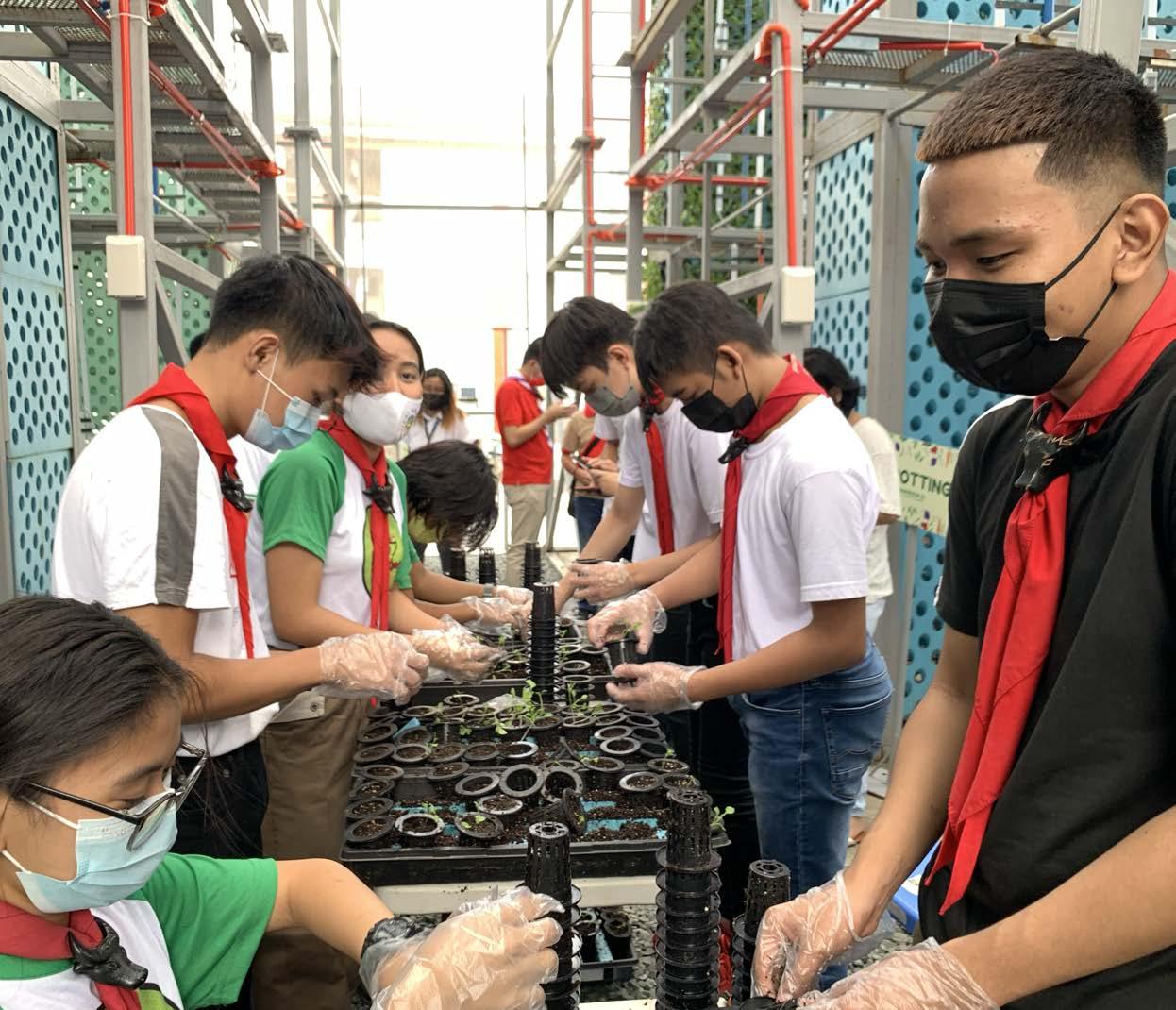
WORLD SCOUT COMMITTEE Midterm Review Report World Triennial Plan 2021 – 2024 12
To deliver on the ambitious objectives set out in the Triennial Plan, the World Scout Committee established an operational framework comprised of different working groups containing of World Scout Committee members, volunteers and World Scout Bureau (WSB) staff. The Triennial Plan was divided into four workstreams and two areas of work to be conducted by task forces and a working group developing the next Strategy for Scouting. Each workstream will implement a number of projects to support the delivery of the Triennial Plan’s objectives. More details about the structure of the workstreams and task forces are available in the “How” section of the plan.
2021-2024 OPERATIONAL FRAMEWORK
Four workstreams (educational methods, World events, communication and partnerships, good governance) that work on projects to operationalise and deliver on the objectives of the Triennial Plan.
One workstream coordination group tasked with coordinating and monitoring progress towards Vision 2023 and the objectives of the Triennial Plan.
Three support units for the workstreams on project management support, volunteer management support, and monitoring and evaluation.
Two task forces on youth engagement in decision-making and sustainability to deliver on specific strategic objectives
World Scout Committee working groups.
Six standing committees: steering committee, finance committee, audit committee, constitutions committee, ethics committee, honours and awards committee.
WORLD SCOUT COMMITTEE
Steering Committee
Finance Committee
Audit Committee
Constitutions Committee
Ethics Committee
Honours & Awards Committee
In addition to the Operational Framework structure, WOSM Services continues to provide tailored support to NSOs on request. The objectives of the Triennial Plan focused on providing support and strengthening the capacity of NSOs are mainly delivered through WOSM Services. This creates the flexibility and agility to support NSOs based on their reality and specific needs, leveraging the full capacity of the organisation through the World and Regional levels.
STANDING COMMITTEES
FORCES Youth Engagement
Strategy for Scouting Sustainability Regions and NSOs monitoring&evaluation s u p port v o lunteer management suppor t project mana g e m e n t ppustro GoodGovernance Communications & Pa r t n e r s h ip s Wor l d Events E d u cationalMethod s Coordination Group 13 WORLD SCOUT COMMITTEE Midterm Review Report World Triennial Plan 2021 – 2024
TASK
Next
PROGRESS OF VISION 2023 (META-INDICATORS)
Vision
Be the world’s leading educational youth movement
Meta Indicator
Delivered 50 World and Regional educational events that inspire NSOs to improve the quality and educational impact of their youth programmes.
Built on 15 global partnerships that advance WOSM's mission.
Been considered by decision makers as a key contributor in the development and implementation of education and youth policy in 20% of NSOs.
Trained and supported 15 young representatives every triennium to take action and help promote WOSM to key stakeholders on a global level
Enable 100 million young people to be active citizen
Increased global market share by 2%
Supported 30% of all NSOs, following GSAT, in developing and implementing sustainable development plans.
Supported 20% NSOs in diversifying their membership by reaching out and engaging with communities where Scouting has not existed before.
Welcomed 15 new Member Organisations.
PROGRESS OF THE 2021-2024 TRIENNIAL PLAN 14 WORLD SCOUT COMMITTEE Midterm Review Report World Triennial Plan 2021 – 2024
The World Scout Committee tracked progress towards achieving Strategy for Scouting - Vision 2023 by monitoring a set of 16 meta indicators that provided an overarching, impact-oriented perspective on the implementation of the Strategy for Scouting - Vision 2023. The meta-indicators were developed from the four themes of the Vision statement - influence, growth, impact, and unity - and are measured twice in each triennium.
15 WORLD SCOUT COMMITTEE Midterm Review Report World Triennial Plan 2021 – 2024 Target March 2023 Indicator status 50 events 241 Events Achieved 15 partners 21 partners Achieved 11 NSOs 26 NSOs Achieved 45 youth representatives 32 youth representatives Behind 4.07% (Baseline 2.07%) 2.37% Behind 52 NSOs 56 NSOs Achieved 34 NSOs 40 NSOs Achieved 15 15 Achieved
PROGRESS OF VISION 2023 (META-INDICATORS)
Vision
Create positive change in the communities
Meta Indicator
Measured the social impact in 50 NSOs, either independently or with WOSM's direct support.
Revived community service in 20% of NSOs where it was previously not a priority.
Measured globally the difference of personal development (skills, knowledge, attitudes, behaviours and values) between Scouts and non-Scouts.
Raised USD 1 million from new funding sources to support community development projects.
Be based on shared values
Confirmed that 100% of NSOs consider WOSM as a united movement based on shared values.
Ensured 30% of NSOs add elements of peace education and intercultural understanding in their youth programmes (where previously nonexisting).
Engaged individuals from at least 5 regions, ensured increased gender balance, and counted at least 40% young people below the age of 30 in all global working groups.
50% of NSOs involved in inter-regional initiatives.
Inspired 70% of NSOs to reference Vision 2023 when developing national strategies.
PROGRESS OF THE 2021-2024 TRIENNIAL PLAN 16 WORLD SCOUT COMMITTEE Midterm Review Report World Triennial Plan 2021 – 2024
17 WORLD SCOUT COMMITTEE Midterm Review Report World Triennial Plan 2021 – 2024 Target March 2023 Indicator status 50 52 NSOs Achieved 34% 134 NSOs Achieved 36 7 NSOs (19%) On track 1,000,000 More than 1,000,000 Achieved 173 NSOs 152 NSOs (88%) On track 52 NSOs 105 NSOs Achieved - 77% On track 86 NSOs 80 NSOs Achieved 121 NSOs 135 NSOs Achieved
PROGRESS OF THE WORLD TRIENNIAL PLAN 2021-2024
Educational Methods Workstream
“Education is at the core business of Scouting, and being part of the educational methods workstream has been a fulfilling journey. As a Scout and educator, I see the importance of our work on peace, environment, life skills, and well-being education of the youth and adult volunteers in shaping the future development of our Movement.”
 Dr. Wayne Adrian Davis, Educational Methods Workstream Oversight
Dr. Wayne Adrian Davis, Educational Methods Workstream Oversight
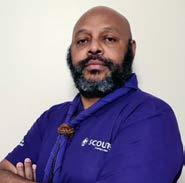
PROGRESS OF THE WORLD TRIENNIAL PLAN 2021-2024 18 WORLD SCOUT COMMITTEE Midterm Review Report World Triennial Plan 2021 – 2024
The educational methods workstream worked on several agile projects to achieve the Triennial Plan’s objectives in four strategic priorities: youth engagement, educational methods, diversity and inclusion, and social impact. This process resulted in tools for volunteer recruitment and retention, enhancing the awareness and development of methods to measure data on diversity and inclusion, supporting NSOs in humanitarian action to build their capacities, and promoting existing WOSM initiatives as well as developing new ones according to the four thematic areas.
The workstream promoted, supported, and facilitated discussions in these areas through events held virtually and in-person and at different levels within the Movement.
WOSM Services were a key method through which NSOs accessed resources and received targeted support in educational methods, including youth programme, youth engagement, Adults in Scouting, diversity and inclusion, Scouts for SDGs, Safe from Harm, spiritual development, and humanitarian action.
“Volunteering for the Earth Tribe initiative has been an eye-opening, incredibly satisfying experience, learning together with our team. I have learned that small actions can have a big impact. Every effort to protect the environment, promote sustainability, and empower young people is a step towards a better future for all.”
Efraim Acosta, Earth Tribe Coordination Team Co-lead

19 WORLD SCOUT COMMITTEE Midterm Review Report World Triennial Plan 2021 – 2024
Youth Engagement
We will begin working on youth engagement in the second half of the triennium based on the work of the Youth Engagement in DecisionMaking Task Force. This will lead to a better understanding of the processes involved and impact of developing the upcoming Strategy for Scouting. The outcomes will help identify areas of work remaining in youth engagement.

The work in this area will start in the second half of the triennium through two projects. The first will use youth engagement principles and Scouting’s leadership model to develop a youth leadership scheme that offers training, learning opportunities by practising leadership roles, and networking opportunities in different regions. The second project involves the review of youth programme and youth involvement policies, which must be completed before the end of the current triennium. We will work closely with the Strategy for Scouting team to ensure that the youth engagement strategy adopted last conference - including its three main goals and objectives — are well integrated into the coming strategy.
Throughout the first half of the triennium, the educational methods workstream closely followed the Movement’s progress in youth engagement, including in decision-making, institutional matters, and external communication, including community-level actions. Regional conferences and youth forums supported youth engagement by ensuring that the topic was further discussed and reflected on during these events.
20 PROGRESS OF THE 2021-2024 TRIENNIAL PLAN Educational Methods Workstream WORLD SCOUT COMMITTEE Midterm Review Report World Triennial Plan 2021 – 2024
Educational Methods
In this area, we focused on ensuring that NSOs were aware of relevant resources and tools available to them by promoting their development and use. The educational methods workstream also established several projects and units to support the achievement of relevant Triennial Plan objectives and resolutions.
We are keen to ensure that key resources such as the Guide To Youth Programme in Scouting (GPS) and Scoutship, are promoted widely across the Movement to ensure that unified and quality Scout education is in place. All other educational methods resources are being used and reaching their targeted users. We will continue to support the promotion and training of these resources at all levels across the Movement.
Adults in Scouting is a main target areas for us moving forward. As such, one of its first projects involved the recruitment and retention of volunteers in Scouting. Some practical tools were developed to support NSOs in this crucial area.
In education for sustainable development, we have continued to promote existing Scouts for SDGs educational initiatives, like the Earth Tribe and Messengers of Peace. Coordination teams for the Earth Tribe and another for SCENES were established to advance environment education among as many NSOs as possible. The SCENES coordination team is also working to ensure that the accreditation and re-accreditation of SCENES centres is up to date.
The development of the life skills initiatives started in 2022 in response to the need in communities to build the capacities of young people in leadership, entrepreneurship, and other areas that will enable them to become leaders in life. Another initiative on health and well-being is being developed to meet the needs of young people and the community in personal hygiene, mental health, and other important areas of health. Both initiatives will be launched during the current triennium.
Teams are also working on redesigning and redeveloping the Scouts for SDGs hub so that we can promote our educational initiatives better through youth-friendly content that will also serve local leaders and NSOs.
Looking ahead, we plan to work on several areas to achieve the objectives outlined for the triennium. A project on positioning Scouting education externally will soon begin to help ensure that Scouting and non-formal education appear on the world agenda when education is discussed. The project will also lead to the creation of a scientific thesis and resources on Scouting and non-formal education that can be used a references for researchers. The teams will also work to provide reference documents to explain the Scout Method using different methods.
21 WORLD SCOUT COMMITTEE Midterm Review Report World Triennial Plan 2021 – 2024
Diversity and Inclusion
In this area, we are working on different methods to evaluate where the Scout Movement and our membership stands in terms of diversity and inclusion, and to identify areas of improvement. The project, an essential element of diversity and inclusion, started in 2022 and its work will be finished by the end of 2023. By the end of the project, a report will be written that replace with consists of data results , and identifies trends and recommendations for the future.
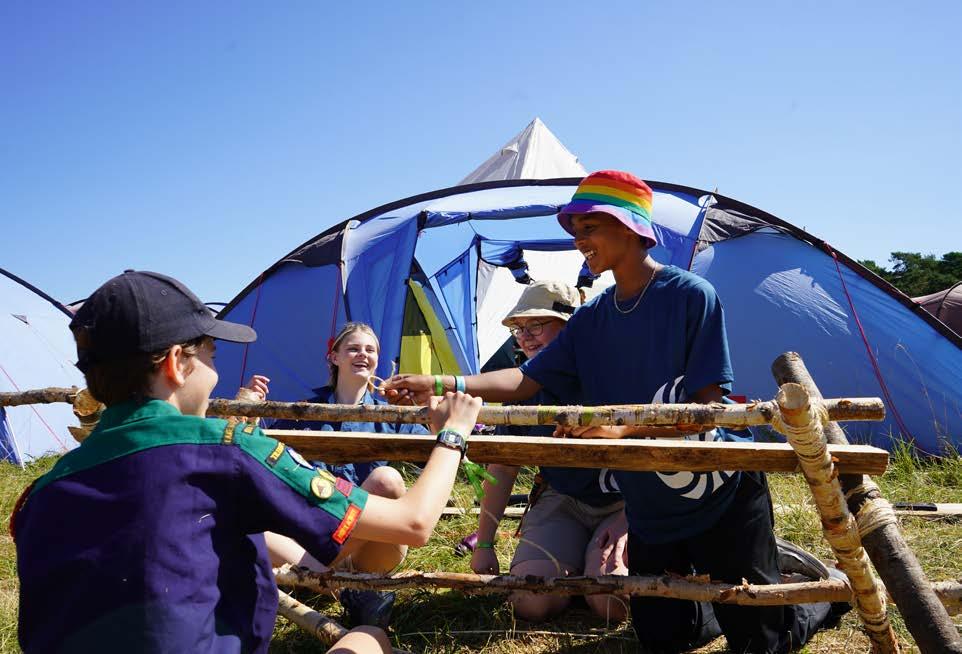
Our work on mainstreaming the area of diversity and inclusion and gender equality will be strengthened through virtual opportunities, global campaigns during international days of action, and by introducing the topics as points of discussion at relevant Regional and World Events. Sessions on “reaching out to all” were developed and delivered at key regional events, including regional conferences and trainings. The sessions were developed to strengthen diversity and inclusion in key areas of Scouting, such as in the growth of our Movement, and in identifying barriers to accessibility and participation.
As a cross-cutting area, we are working to ensure that Scouting education is open to all. As such, alignment is being implemented with the Youth Programme, Adults in Scouting, youth engagement, humanitarian action, Safe from Harm, and other relevant areas. Furthermore, a series of dialogues and workshops will be conducted in order to create synergies between the different areas of Scouting and our mission and growth, making Scouting more inclusive and accessible to all
22 PROGRESS OF THE 2021-2024 TRIENNIAL PLAN Educational Methods Workstream WORLD SCOUT COMMITTEE Midterm Review Report World Triennial Plan 2021 – 2024
Social Impact
We have been committed to continuing the progress made in recent years in social impact. To expand the benefits of the Social Impact project in the European Scout Region, the educational methods workstream worked to make it available to more NSOs worldwide. Thanks to funding from several institutions and support from academia, the project is working towards creating a comprehensive social impact service area within the WOSM Services by 2024.
This service area will provide NSOs with access to a range of resources and trained consultants to support them in measuring their social impact at various levels. The project aims to help NSOs understand the impact of their programmes and activities on communities and provide guidance on how they can have more social impact. By doing so, NSOs can better demonstrate their value to stakeholders and improve their contributions to their communities.
The project is set to achieve most of the triennial objectives in the strategic priority area of social impact. We look forward to supporting NSOs worldwide in measuring and improving their social impact. By doing so, we can continue to work towards our shared goal of creating positive change in the world through Scouting.

23 WORLD SCOUT COMMITTEE Midterm Review Report World Triennial Plan 2021 – 2024
PROGRESS OF THE 2021-2024 TRIENNIAL PLAN
Educational Methods Workstream
A new framework to ensure inclusive participation of young people in decision-making processes is implemented for the World Scout Conference 2024.
Over 70% of NSO national boards include at least 30% young people.
The GSAT score across the Youth Involvement dimension is 10% higher compared to the previous triennium, including the educational elements of Youth Involvement.
70% of young people involved in governance or operational bodies of World Scouting express that inputs of young people were taken into account and contributed to the decision-making process.
60% of NSOs who haven’t updated their youth programme in the past five years, have reviewed or innovated their educational proposals.
Methods To
SP
24
WORLD SCOUT COMMITTEE Midterm Review Report World Triennial Plan 2021 – 2024
performance indicator Strategic priority Target Result Status
Key
SP - 1: Youth Engagement Established framework Ongoing On track
SP - 1: Youth Engagement 121 25 At Risk
SP - 1: Youth Engagement 78.7% 67.50% At Risk
SP - 1: Youth Engagement 70% 83.78% On track
- 2: Educational
18 NSOs 8 Behind
SP
Methods
- 2: Educational
be assessed at the end of the Triennium
20% more NSOs have adopted new thematic areas of the Better World Framework as complementary offerings to their youth programme. be assessed at the end of the Triennium /
To
Key Performance Indicators (Educational Methods Workstream)
Adult volunteer retention in NSOs has increased globally by 10%.
A minimum of 18 NSOs will have implemented a comprehensive methodology to measure their membership diversity and identify potential barriers to inclusion as a basis for establishing a global state of the Movement analysis.
30% of NSOs improved their membership gender balance by 5%.
50% of NSOs scored above 50% in all seven areas identified in World Scouting’s Self-Assessment for Diversity and Inclusion.
40% of NSOs are reaching out to new communities with members not typically served by Scouting.
40% of NSOs have measured their Social Impact by 2024.
70% of NSOs have developed a plan to map and actively reach out to and engage their beneficiaries by 2024
40% of NSOs are active or have plans in place to be prepared for and respond to humanitarian disasters.
25 WORLD SCOUT COMMITTEE Midterm Review Report World Triennial Plan 2021 – 2024
Strategic priority Target Result Status
Key performance indicator
SP - 2: Educational Methods To be assessed at the end of the Triennium To be assessed at the end of the Triennium /
SP - 3: Diversity and Inclusion 18 NSOs 30 NSOs Achieved
SP - 3: Diversity and Inclusion 52 NSOs 9 NSOs At Risk
SP - 3: Diversity and Inclusion 86 NSOs 8 NSOs At Risk
SP - 3: Diversity and Inclusion 69 NSOs 50 NSOs On track
SP - 4: Social
69 NSOs 33 NSOs Behind
impact
SP - 4: Social
121 NSOs 79 NSOs On track
impact
SP - 4: Social impact 69 NSOs 70 NSOs Achieved
World Events Workstream
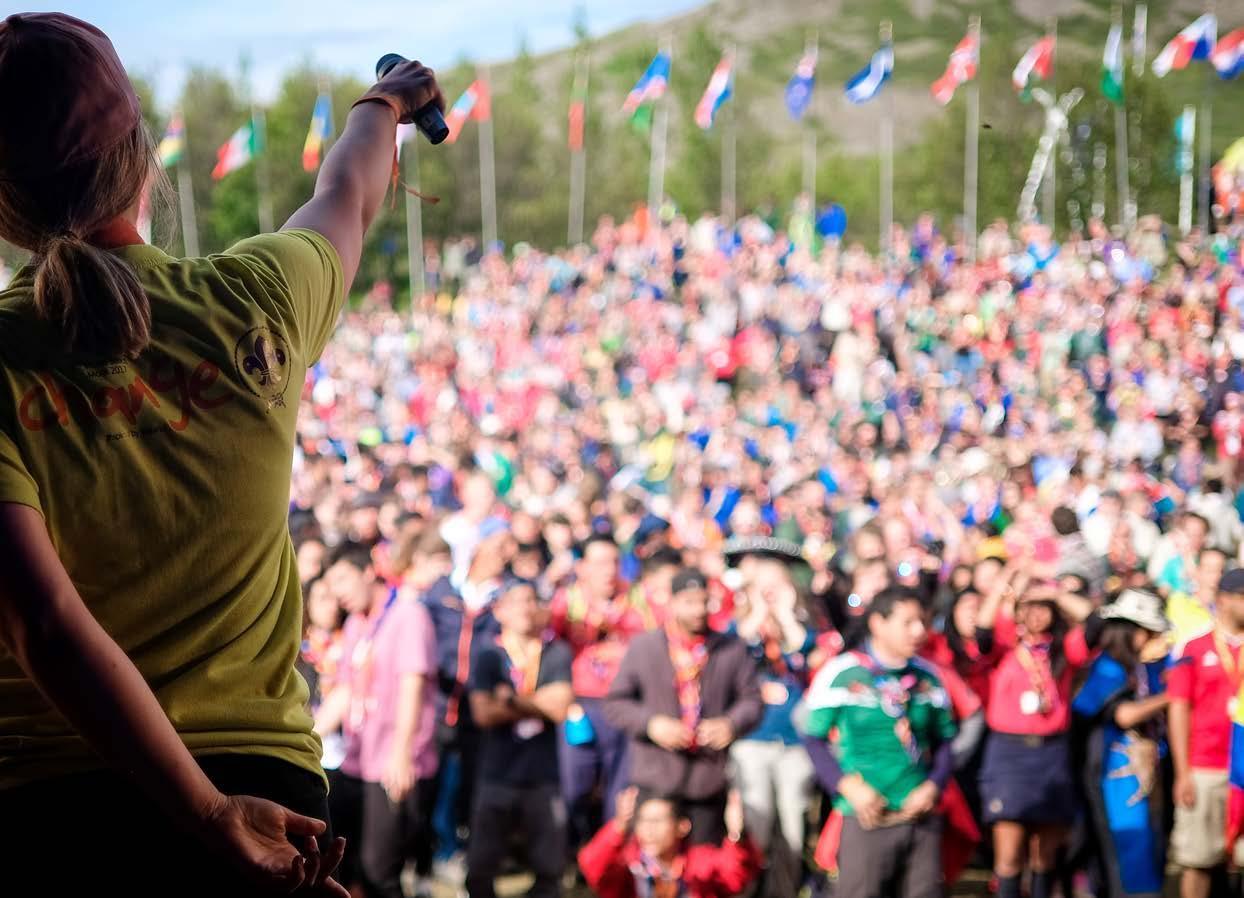
PROGRESS OF THE WORLD TRIENNIAL PLAN 2021-2024 26 WORLD SCOUT COMMITTEE Midterm Review Report World Triennial Plan 2021 – 2024
The newly-formed World Events workstream supports current and future World Event hosts in planning and delivering inclusive and sustainable events. At the mid-point of the triennium, we made significant progress towards achieving our objectives, as outlined in the World Triennial Plan by organising the JOTA-JOTI (2021, 2022). In the second half of the triennium, the workstream will focus on delivering the 25th World Scout Jamboree, Republic of Korea (2023), the 4th World Scout Education Congress in France (2023), and the 43rd World Scout Conference, Egypt (2024).
The workstream also reviewed the format of World Scout Events to strengthen their sustainability, accessibility, and inclusion.

“Our societies, our communication methods, our way of shaping our movement is changing incredibly fast – we, therefore, need to adapt, develop, and innovate our highest constitutional meeting: the World Scout Conference. The guiding principles for this huge task are youth involvement, sustainability, digitalization, and engagement. What a journey to be on!“
Djuna Bernard, Luxembourg, Evolution of the World Scout Conference project Volunteer Co-Lead

27 WORLD SCOUT COMMITTEE Midterm Review Report World Triennial Plan 2021 – 2024
World Events
During this period, we provided ongoing support to our current World Event hosts, specifically in the areas of WOSM support and coordination for the upcoming 25th World Scout Jamboree in August 2023, as well as preparations for the 43rd World Scout Conference in Cairo, Egypt in August 2024.


In addition to this support, our workstream completed its first project to evolve the World Scout Youth Forum and World Scout Conference into a new event. This project aimed to achieve a more inclusive, diverse, and engaging World Scout Conference by using innovative methods with a clear focus on youth participation in decision-making. The volunteer group’s key outcome was to redesign the World Scout Conference as a new event, incorporating lessons learned from past events and innovative methods to prioritise youth participation in decision-making.
We proposed an event to replace the previous format of the World Scout Youth Forum and World Scout Conference in 2024 and beyond. This revamped event, called the World Scout Conference, will build on and consolidate the current format of the World Scout Youth Forum to create an enhanced and empowering experience for youth. We spent eight months developing a detailed concept that will be shared with the Movement later in 2023, incorporating feedback and input from key stakeholders.
We also started efforts to review and innovate all World Scout Events, which will be presented at the 43rd World Scout Conference. With significant participation from NSOs, we are scrutinising all World Events to ensure they are designed and executed with the intention of facilitating access, accessibility, impact, inclusion, and participation for all young people.
28 PROGRESS OF THE 2021-2024 TRIENNIAL PLAN
WORLD SCOUT COMMITTEE Midterm Review Report World Triennial Plan 2021 – 2024
Educational Methods Workstream
To accomplish this, a team of volunteers is reviewing all World Events through the lens of accessibility and inclusiveness. They are committed to examining various critical aspects of these events to determine how they can be made more cost-effective and promote solidarity operations. Additionally, they will assess the degree of accessibility and inclusiveness of these events and determine whether they comply with environmental sustainability principles.
The team will also evaluate the application of digital technology in the planning and execution of these events and assess how well they align with regional events. They will evaluate the various risks associated with these events and determine the best ways to manage them. Additionally, they will evaluate the feasibility of an accreditation system for World Event venues and review all existing World Event guidelines.
To achieve these objectives, the team will work in small groups, hold online consultations, and solicit feedback from relevant stakeholders. They aim to deliver on these key outcomes to ensure that all future World Events are as inclusive and accessible as possible, taking into account the diverse needs of all individuals. This project will help to promote greater diversity and inclusiveness in global events and ensure that all individuals have the opportunity to participate fully.
Key Performance Indicators (World Events Workstream)
29 WORLD SCOUT COMMITTEE Midterm Review Report World Triennial Plan 2021 – 2024
performance indicator Strategic priority Target Result Status World Scout Conference 2024 with 40% of participants below the age of 30. SP - 2: Educational Methods 40% of World Scout Committee 2024 participants To be assessed at the end of the Triennium / 100% of World Scout Events have an improved and updated event framework to better reflect World Scouting’s considerations on programme, sustainability, risk mitigation, inclusiveness, accessibility, and youth participation. SP - 2: Educational Methods An updated Framework for World Events is established Ongoing On track
Key
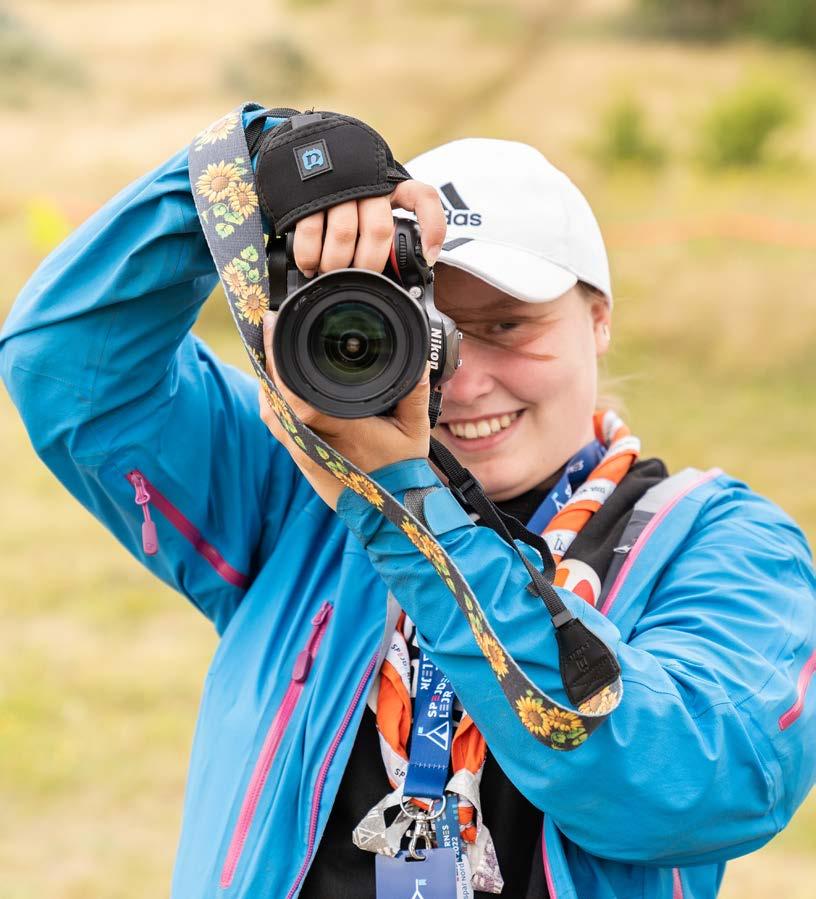
Communications and Partnerships Workstream PROGRESS OF THE WORLD TRIENNIAL PLAN 2021-2024 30 WORLD SCOUT COMMITTEE Midterm Review Report World Triennial Plan 2021 – 2024
The communications and partnership workstream worked on different projects and initiatives aimed at achieving the Triennial Plan’s objectives. It begun the process to refresh the Scouting brand, and worked on series of new communications strategies. Among the highlights in the first part of the Triennium was the launching of the new “Treehouse” community for Member Organizations, including a new hub for WOSM Services and an online Learning Zone library.
In the area of partnerships, highlights include inducting a new cohort of Youth Representatives as the face of our youth-led advocacy activities, sending delegations of WOSM and NSO representatives to COP26 and COP27, ensuring a strong voice at the Transforming Education Summit at the UN General Assembly, establishing of strategic partnerships, and improving our internal systems and approaches to business development. Additionally, NSOs have continued to access resources and received targeted support through the WOSM Services areas of communications and partnerships.
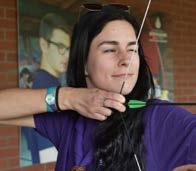
“The workstream has been working on various initiatives to improve WOSM’s communications and partnerships work. We have been developing new strategies for internal and external communications, social media, and digital transformation. The launch of a new membership community has made Scouting resources more accessible, and our focus remains on impact-driven communications. We will continue working on the brand refresh project, finalising communication strategies,
and providing timely updates to NSO leadership on achieving the World Triennial Plan objectives. In the area of partnerships, we started working on first the business development and resource mobilisation strategy to increase and diversify World Scouting’s resources in collaboration with the World Scout Foundation. We also continue to expand partnership development, as well as enhance our grant management and advocacy efforts.”
Nika Gorovska, Communications and Partnerships Workstream Oversight
31 WORLD SCOUT COMMITTEE Midterm Review Report World Triennial Plan 2021 – 2024
Communications and Partnerships
Communications
At the mid-point of the triennium, we made considerable progress towards achieving the communications objectives we established in the World Triennial Plan.
We began the process to refresh the Scouting brand by undertaking a full review of the existing brand, conducting an analysis of how the Scouting brand is perceived online, running focus groups with key stakeholders to gather feedback, and tendering a proposal to partner with a world-class design and marketing agency on this work for the remainder of the triennium.
Alongside the development a new Vision and Strategy for Scouting to guide our Movement for the next decade, the work to refresh the Scouting brand, including our visual identity, messaging, and adaption for digital use, continues to position us as the world’s leading educational youth movement among NSO leadership, young people, adult volunteers, parents, partners, and donors.

32 PROGRESS OF THE 2021-2024 TRIENNIAL PLAN
WORLD SCOUT COMMITTEE Midterm Review Report World Triennial Plan 2021 – 2024
Workstream
A series of new communications strategies focused on the areas of internal communications, external marketing, social media, and digital transformation are also in development. Together, these strategies centred around impact-driven communications in line with the latest trends in these areas will guide our work throughout the triennium and beyond.
Through the development and launch of a new “Treehouse” community for Member Organizations, including a new hub for WOSM Services and an online Learning Zone library, we have made it easier to discover and access Scouting resources. We also continue to translate and make available key resources in multiple languages, as well as put in place good practices to make our resources more concise and clearer to understand.
Finally, we continue to provide timely communications in both official languages through ScoutPak, town halls, and other communications channels to ensure that NSO leadership are informed and up-to-date with the latest news and announcements from World Scouting.
Looking ahead to the remainder of the triennium, our communications efforts will continue to work on the design, development, and implementation of a refreshed Scouting brand, finalise the development and rollout of a suite of communications strategies, and to communicate timely and relevant news and information for NSO leadership linked with our strategic priorities.
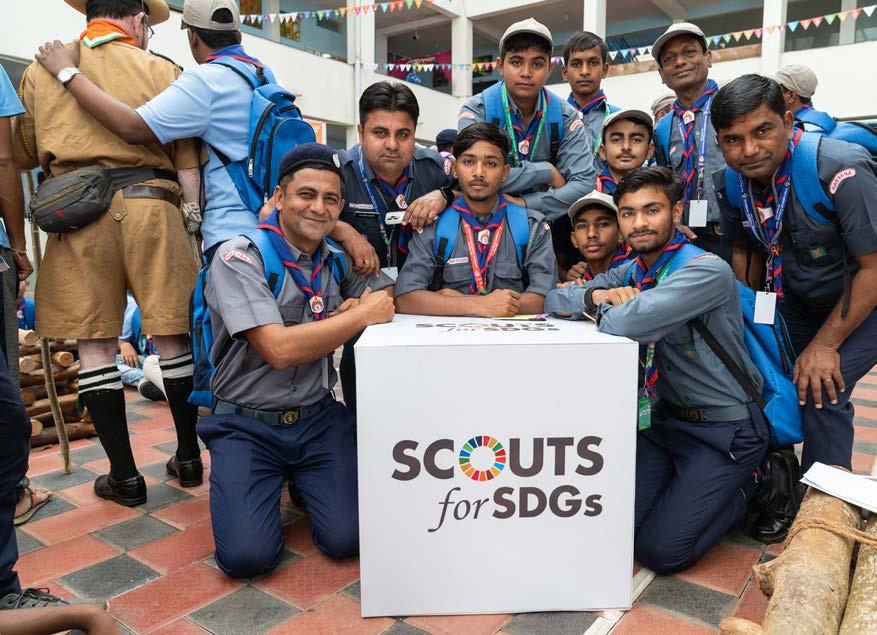
33 WORLD SCOUT COMMITTEE Midterm Review Report World Triennial Plan 2021 – 2024
Communications and Partnerships Workstream
Partnerships
Scouts have been active since the start of the triennium in making their voices heard, advocating for the issues that they care about, and building new partnerships to support the delivery of the Triennial Plan.
A new cohort of Youth Representatives was inducted to be the face of our youth-led advocacy activities across six key thematic areas: peace, environment, education, SDGs, gender, and rights. From being elected to the steering committee of the new WHO Youth Council to building stronger foundations in youth platforms like International Coordination Meeting of Youth Organisation, the Youth Representatives are actively contributing to the sustainable development agenda while ensuring that Scouting is visible and well recognised.
Key advocacy moments have included sending delegations of WOSM and NSO representatives to COP26 and COP27 and ensuring a strong voice at the Transforming Education Summit at the UN General Assembly. These advocacy moments were complemented by the ongoing development of policy-focused resources by two Operational Framework projects on sustainability and peace advocacy. These will result in training events, references, and position papers that will be available for NSOs to use for national level advocacy.
Gearing up for the World Scout Jamboree and World Scout Education Congress, preparations are in the works to ensure a strong presence from our global partners into the programmes of these two key events for Scouting.
Regarding partnerships, our strong advocacy efforts have directly resulted in the formation of new relationships to support the delivery of our Triennial Plan, including with the World Health Organisation, World’s Largest Lesson, the Higher Education for Good Foundation, the Foundation for Environmental Education and others currently under development.
We also started to improve our internal systems and approaches to business development, supported by a clear work plan, concrete yearly objectives and better alignment between Global and Regional teams. This work will be strengthened by a business development and resource mobilisation strategy for WOSM, which will be ready later in 2023.
34 PROGRESS OF THE 2021-2024 TRIENNIAL PLAN
WORLD SCOUT COMMITTEE Midterm Review Report World Triennial Plan 2021 – 2024
The GSAT score across the Communication, Advocacy and Public Image dimension increased by 10% compared to the previous triennium.
NSOs report a 10% improvement in the accessibility, relevance, timeliness and clarity of World Scouting’s resources and communications.
20% of NSOs have implemented new or existing Global or Regional partnerships at the national level.
Global and Regional partners and other key stakeholders in the youth development, non-formal education and international development sectors see WOSM as a leading and influential educational youth movement.
SP
- 5:
35 WORLD SCOUT COMMITTEE Midterm Review Report World Triennial Plan 2021 – 2024
Strategic priority Target Result Status
Key performance indicator
SP - 5: Communications and partnerships 74% 85% Achieved
SP - 5: Communications and partnerships / To be assessed at the end of the triennium /
SP - 5: Communications and partnerships 35 NSOs 33 NSOs On track
SP - 5: Communications and partnerships / To be assessed at the end of the triennium /
WOSM has diversified and increased its number of funding sources by 20% through new institutional, philanthropic and private sector partnerships. Communications and
Partnerships
partners 3 new
Achieved
2 new
partners
Key Performance Indicators ( Communications and Partnerships Workstream)

PROGRESS OF THE WORLD TRIENNIAL PLAN 2021-2024 36 WORLD SCOUT COMMITTEE Midterm Review Report World Triennial Plan 2021 – 2024
Good Governance Workstream
The good governance workstream continued its work in the areas of governance, Safe from Harm, and growth. Highlights in this area include the review of the global support assessment tool (GSAT) standard, the development and the implementation of the Safe from Harm compliance mechanism, and the welcoming of the NSO of Antigua and Barbuda as WOSM’s 173rd member. At the same time, the workstream worked on constantly improving WOSM Services by facilitating training for over 200 WOSM consultants and supporting the development of the new WOSM Services platform on Treehouse. The workstream continued to provide targeted support to NSOs through WOSM Services in the areas of GSAT, Safe from Harm, good governance, and growth.
“An important aspect of the work in the Good Governance workstream is capacity building and support to NSOs through WOSM services. To ensure we continue to deliver relevant and timely support, many new consultants have been on-boarded and the new Treehouse has been developed.
Another important piece of work is the review of GSAT which will culminate in the launch of a new standard; GSAT 3.0.
One of the biggest projects in the workstream is to implement the Safe from Harm compliance decision from the Conference. I am so proud that almost all NSOs voted in favor of strengtening Safe from Harm as it is the right of every child, young person and adult to be and to feel safe in Scouting.
Many other activities are taking place in the workstream - from support with inductions to new resources on financial management. I am looking much forward to see all of this being fully implemented to the benefits of strengthening NSOs and World Scouting as a whole.”
Pia Melin Graasbøll, World Scout Committee Good Governance Strategic Oversight Communications and Partnerships Workstream Oversight
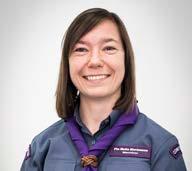
37 WORLD SCOUT COMMITTEE Midterm Review Report World Triennial Plan 2021 – 2024
Good Governance
Over the past year, WOSM Services has continued to transform the way we operate as a global Movement by providing innovative capacity strengthening services and support to our membership of 173 NSOs across 13 service areas. We delivered 189 services since the start of the triennium, reaching nearly 85% of NSOs.
The focus of the last period was on developing new WOSM Services webpages on Treehouse to make the content more dynamic and engaging. Close to 200 WOSM Consultant were recruited or had their mandates renewed. Next year, the consultants will receive additional training. There will also be work on the backend of the WOSM Services platform to make it easier to request and manage a WOSM Service.
An additional 21 assessments using GSAT were also conducted in this period to measure NSOs against international best practices in good governance and quality Scouting, helping them create custom action plans to address areas for improvement.
A review of the GSAT standard is underway. The new standard along with a new digital tool will be released in 2023.
The good governance service was strengthened with new resources in financial management. Nine consultants were trained and prepared to support NSOs in financial management.
New resources were developed in risk management and a new service area was created under the good governance service to further reinforce this support.

38 PROGRESS OF THE 2021-2024 TRIENNIAL PLAN Good Governance Workstream WORLD SCOUT COMMITTEE Midterm Review Report World Triennial Plan 2021 – 2024
Safe From Harm
It is the right of every child, young person and adult to be safe in Scouting. Therefore, the World Scout Conference agreed to ensure that the World Safe from Harm policy is fully implemented in all NSOs.
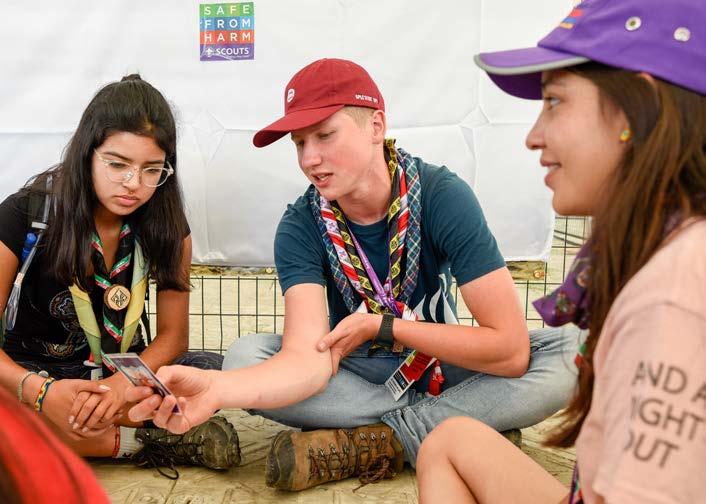
A mechanism to monitor the implementation of the World Safe from Harm policy at the NSO level was developed and released to NSOs. Additional building blocks, such as a digital assessment tool, will be added in 2023.
Internal stakeholders were engaged in the development process, as well as external experts to strengthen our knowledge of safeguarding international best practices. The mechanism was piloted with NSOs in all regions. The assessment mechanism builds on the structure and learnings from GSAT and is now integrated into the annual reporting process.
The second half of the triennium will focus on supporting the implementation, including by supporting NSOs to use the selfassessment and identify areas where they need to strengthen their processes around safeguarding and to support implementation among NSOs.
39 WORLD SCOUT COMMITTEE Midterm Review Report World Triennial Plan 2021 – 2024
Good Governance Workstream
Communication from WOSM about the importance of Safe from Harm increased during the triennium with the majority of NSOs reached through Regional Scout Conferences, NSO town halls, Safe from Harm week, and other interactions.

Data shows us there is a sense of urgency in the Movement around Safe from Harm. Since the World Scout Conference, the Safe from Harm area has been the most visited of the WOSM Services pages. Service requests are also increasing.
The Safe from Harm services page has been restructured to make it easier for NSOs to access support. More resources around the educational aspects of Safe from Harm as well as Safe from Harm in events were added to the pages.
New guidelines on how to integrate Safe from Harm in World and Regional Events were developed along with efforts made to ensure that Safe from Harm measures are put in place at all events. Work with the World Scout Jamboree hosts in Korea is a priority.
A new partnership was initiated with Keeping Children Safe to further work and learn from international organisations specialised in safeguarding.
40 PROGRESS OF THE 2021-2024 TRIENNIAL PLAN
WORLD SCOUT COMMITTEE Midterm Review Report World Triennial Plan 2021 – 2024
Growth
Since the start of the triennium, we prioritised support for NSOs to recover from the impacts of the pandemic. One year later, census data suggested that WOSM’s membership had a moderate increase in the second year of the pandemic and had recovered from the initial challenges of 2020, showcasing the resilience of our NSOs to quickly adapt and respond to new realities.
WOSM’s growth service remained a key method through which we supported NSOs in sustainable growth. This included by creating and implementing growth and retention strategies, developing recruitment campaigns, and improving membership management systems. These efforts were further aided through funds for growth projects within the Re-energising Scouting Fund, which provided much-needed financial support to NSOs. With the Operational Framework project “Growth, recovery and resilience - enabling capacities for growth”, we developed new resources and made existing resources accessible by translating them into more languages. The project provided a platform for NSOs to share their experiences and challenges, as well as inspire each other with innovative ideas for growth.
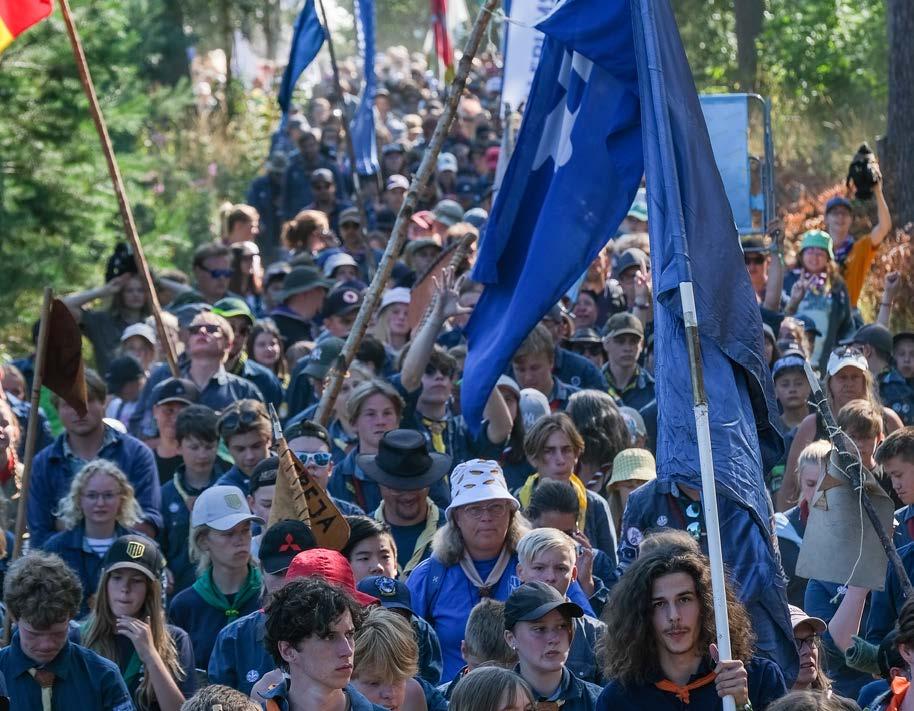
41 WORLD SCOUT COMMITTEE Midterm Review Report World Triennial Plan 2021 – 2024
PROGRESS OF THE 2021-2024 TRIENNIAL PLAN
Good Governance Workstream
WOSM continues to grow in new countries and territories by expanding its educational offerings to more young people. In November 2022, we officially welcomed the NSO of Antigua and Barbuda as a 173rd member of the Movement. Global and Regional Support Centres are also working with the Scouting organisations in Congo, Mali, and Albania to support them to become members of WOSM by the end of 2023. Ongoing efforts to establish NSOs are continuing in the Central African Republic, Kyrgyzstan, and Uzbekistan.

This work continues to expand the offerings of the growth service and strengthen the capacities of current and new growth consultants. It also builds on parallel efforts to continue working with NSOs with high membership potential by encouraging peer-to-peer learning among NSOs and supporting them to enhance their membership in new areas

42
WORLD SCOUT COMMITTEE Midterm Review Report World Triennial Plan 2021 – 2024
Governance
To provide support in a more impactful way for NSOs, an improved system for receiving feedback on resources and monitoring data on usage is being developed for deployment later in the triennium.
Work on increasing data-driven decision making has focused on making data more accessible to more people. Core data, such as on annual reporting, GSAT assessments, WOSM Services data and fee collection, now supports decision making by the World Scout Committee and World Scout Bureau.
WOSM is working on continuously improving how we implement our policies. During this triennium, the Safe form Harm policy was implemented at more levels within WOSM. The procedures around reporting complaints is actively supported by the ethics committee.
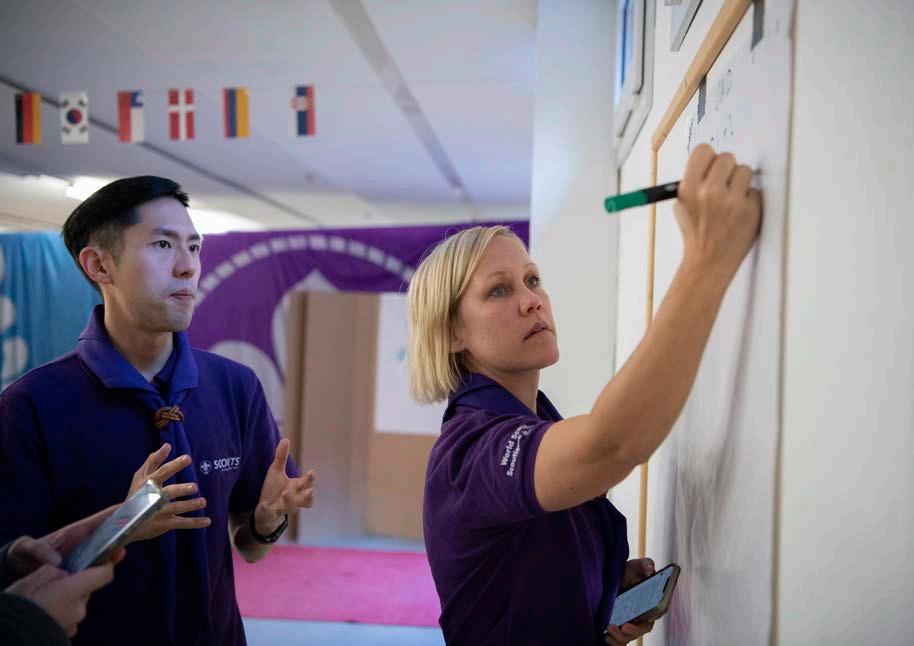
43 WORLD SCOUT COMMITTEE Midterm Review Report World Triennial Plan 2021 – 2024
Good Governance Workstream
To live up to international best practices, WOSM became a member of Accountably Now. This involves undergoing an external review practices connected to transparency, accountability, and governance.
WOSM continues to encourage NSOs to exchange best practices and learnings with each other through both in-person and online events. The WOSM Services platform features best practices in all service areas. With the release of the new pages for WOSM Services on Treehouse, there will be a possibility to create communities of practice on different topics. This will enable further exchange between the regions.
As a result of communications efforts and involvement between the regional and global levels, the Regional and Global Triennial Plans were well aligned in the last triennium of the Strategy for Scouting: Vision 2023.
Coordination across the organisation occurs on a regular basis through the World Scout Committee where the Regional Chairs are members, through the Senior Management Team (Secretary General, Regional Directors and Global Directors) and through Thematic Teams with staff members working in specific areas collaborate.

44
PROGRESS OF THE 2021-2024 TRIENNIAL PLAN
WORLD SCOUT COMMITTEE Midterm Review Report World Triennial Plan 2021 – 2024
50% of NSOs increased their membership between 2021 and 2024.
Key Performance Indicators (Good Governance Workstream)
WOSM membership growth by 10% between 2021 and 2024.
80% of the NSOs that lost membership as a result of the COVID-19 pandemic have fully recovered their membership numbers
The average GSAT score across the dimensions of governance* is 10% higher than in the previous triennium.
90% of NSOs which have received a WOSM Service are satisfied and would recommend the service to others.
45 WORLD SCOUT COMMITTEE Midterm Review Report World Triennial Plan 2021 – 2024 Key performance indicator Strategic priority Target Result Status
SP - 6: Good governance 86 NSOs 51 NSOs On track
SP - 6: Good governance 10% 3% At Risk
SP - 6: Good governance 66 NSOs 13 NSOs At Risk
SP - 6: Good governance 54% 65.7% Achieved
SP - 6: Good governance 56 NSOs 60 NSOs Achieved
Youth Engagement in Decision-Making Task Force

“We have conducted the most in-depth research on youth leadership in WOSM, combined with an intensive design thinking exercise, offering a deep understanding of the barriers and a very interesting set of actions to take the next step in youth leadership in our movement and ensure intergenerational decision making in Scouting.”
Juan Reig Serrano, Task Force Co-lead
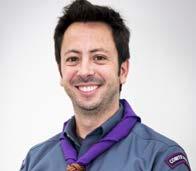
46 PROGRESS OF THE 2021-2024 TRIENNIAL PLAN Good Governance Workstream WORLD SCOUT COMMITTEE Midterm Review Report World Triennial Plan 2021 – 2024
Significant progress was made in youth engagement at the national, regional, and global levels over the last decade, and this commitment was reaffirmed in Conference Resolution 2021-07 at the most recent World Scout Conference.
This was the starting point of the Youth Engagement in Decision-Making Task Force, which from March 2022 to February 2023 worked towards achieving two main objectives:
• To identify institutional, structural, and cultural barriers to meaningful youth participation in WOSM’s decision-making processes, as well as opportunities and recommendations to overcome these barriers.
• To propose potential alternative measures to replace the current Youth Advisor system and to ensure the representation, as well as effective and meaningful participation, of young people on the World Scout Committee.
To accomplish these objectives, different stakeholders were consulted for their experience, openness, inputs, and insight on how to address the challenges of engaging young people in WOSM’s decision-making processes. These stakeholders included NSOs, former delegates of the World Scout Youth Forums and World Scout Conferences, current and former Youth Advisors to the World Scout Committee, current and former members of the World Scout Committee, and the Educational Methods team of the World Scout Bureau.
For two months, the task force used a combination of methods to ensure that a balance of quantitative and qualitative inputs was gathered.
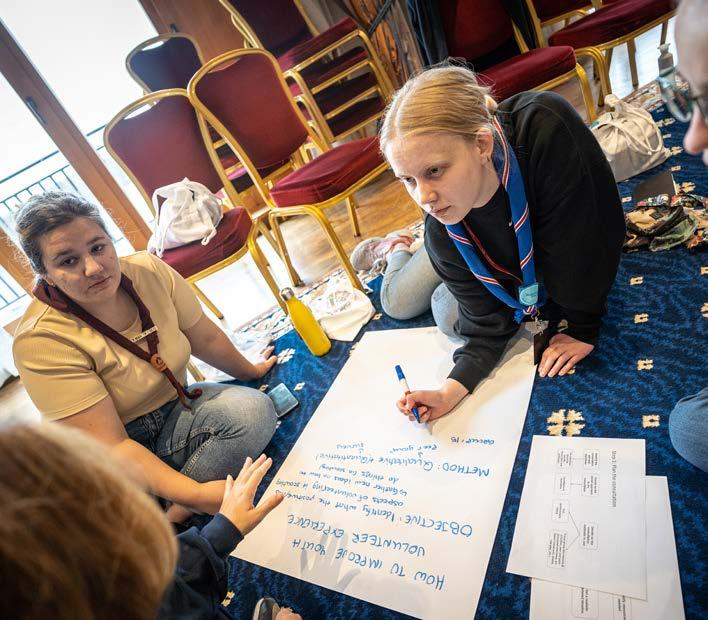
47 WORLD SCOUT COMMITTEE Midterm Review Report World Triennial Plan 2021 – 2024
Good Governance Workstream
From 30 June to the 31 August 2022, a survey on Youth Engagement was conducted in English, French, Spanish, Arabic, and Russian. The task force collected insight from 97 out of 210 NSOs and NSAs (the total of 210 does not consider the federation level structure), which represented a 46% response rate, with the six regions represented as follows:
• Africa 30%
• Arab 42%
• A sia Pacific 93%
• Eurasia 67%
• Europe 24%
• Interamerica 69%
In addition to the survey, 18 focus groups were conducted in July, August, and September, with 76 participants sharing their vision on youth engagement, identifying the main challenges young people face, and making recommendations for the future of youth engagement in WOSM.
A final report will outline the recommendations of the task force to address identified barriers for youth engagement in decision making at the institutional, structural, and cultural levels, as well as measures to be implemented to ensure both representation and effective, meaningful participation of young people in the World Scout Committee, when replacing the current Youth Advisor system.
As expressed in Conference Resolution 2021-07, the report will be sent

48
PROGRESS OF THE 2021-2024 TRIENNIAL PLAN
WORLD SCOUT COMMITTEE Midterm Review Report World Triennial Plan 2021 – 2024
Sustainability Task Force
Sustainability Task Force focused its work in the first half of the triennium on developing WOSM’s climate impact strategy. The task force began this work by first defining the scope and objectives of the strategy and then by conducting a baseline study to understand the full picture of WOSM’s current climate impact. The strategy is currently at the drafting stage and will be completed mid-2023. In addition to laying out clear goals and targets for WOSM to become a climate neutral organisation, the strategy will outline how WOSM will reduce and offset its carbon emissions, how the strategy will be governed and reported on, and how it will be managed and budgeted.
“We took the first firm steps on an exciting new journey for WOSM to work towards becoming climate-neutral in our operations by 2033. In this first stage of work, we followed established best practice and firstly focused on conducting a baseline study to assess our current situation, involved all relevant governance groups and
Fabian Loske, Member of the Sustainability Taskforce

mapped out concrete next steps in delivering this strategy across all WSB support centres. With the strategy being expanded across the organisation over the next trienniums, we’re developing and providing the necessary tools, also to NSOs, to work towards reducing the climate impact of world scouting.”
Key activities:
• B aseline study of WOSM’s climate impact
• Complete scope and outline of climate impact strategy
• Draft climate impact strategy
After finalising the strategy, the Sustainability Task Force will focus its efforts on supporting NSOs to become positive actors on climate change through new tools and resources that will strengthen their capacities and enable them to join WOSM on its journey to climate neutrality.
49 WORLD SCOUT COMMITTEE Midterm Review Report World Triennial Plan 2021 – 2024
Next Strategy for Scouting
Follow the ongoing process to develop the next Strategy for Scouting at strategy.scout.org

PROGRESS OF THE WORLD TRIENNIAL PLAN 2021-2024
50 WORLD SCOUT COMMITTEE Midterm Review Report World Triennial Plan 2021 – 2024
In line with the Operational Framework 2021-2024, the World Scout Committee tasked a group of its members to conduct an initial reflection on the development process of the Strategy for Scouting beyond 2023. This strategy group explored different aspects linked to the conclusion of the current Strategy for Scouting (Vision 2023) and the design of the next Strategy for Scouting and upcoming planning processes at the World and Regional level. They developed a concept note that initiated a process in five phases covering research (September 2022 – February 2023), prioritisation (March 2023 – June 2023), validation (July 2023 – December 2023), approval (January 2024 –August 2024) and implementation (September 2024 onwards).
The group initiated preparations for the research phase by engaging various stakeholders’ groups that reflected the landscape of World Scouting. A team of researchers was recruited that developed a plan to analyse the situation of the Scout Movement and the impact of Vision 2023, as well as further understand the youth and societal trends for the future. To achieve this task, 20 focus groups were created, comprised of young people, adults in Scouting, NSO leadership, World and Regional Scout Committees, partners and WOSM volunteers and staff. WOSM also partnered with the Youth Talks, a global consultation for young people between 15 and 29, to gather over 150,000 contributions from all over the world. The results of the research phase has been published on strategy.scout.org in March 2023 and provides a strong foundation for NSOs to consider in their own strategic planning processes.
During the subsequent prioritisation phase, the Movement has the opportunity to reflect on the research results and define the WOSM’s next strategic framework through engagements online and in-person. The WSC initiated this phase with an initial exercise at its meeting in March 2023 and we subsequently brought together over 60 participants from NSOs, WOSM structures and partners to a “Next Strategy for Scouting” workshop in May 2023. This collaborative workshop yielded a first draft of the building blocks of the next Strategy, which after an initial review by the WSC will go through a thorough validation phase until December 2023. This will include feedback from all of WOSM’s 173 NSOs, young people, local leaders as well as partners and external perspectives.
51 WORLD SCOUT COMMITTEE Midterm Review Report World Triennial Plan 2021 – 2024
World Scout Committee Working Groups

PROGRESS OF THE WORLD TRIENNIAL PLAN 2021-2024 52 WORLD SCOUT COMMITTEE Midterm Review Report World Triennial Plan 2021 – 2024
Continuous Improvement Unit
The Continuous Improvement Unit is tasked with evaluating in-person World Scout Committee meetings, self-evaluations, and peer reviews to provide key recommendations on working methods and World Scout Committee engagement practices.
Over the last 18 months the Continuous Improvement Unit has:
• Evaluated all World Scout Committee meetings and made recommendations to the steering committee and World Scout Committee on their workings.
• Introduced a self evaluation and peer review in September 2022.
• Repeated the team charter at each World Scout Committee meeting. Appreciation for this method was expressed in the September 2022 meeting.
• B een involved with social media training facilitated by the World Scout Bureau.
• Invited World Scout Committee members to contribute to the programme during the February 2022, August 2022 and February 2023 town hall.
• Introduced a speakers’ corner to World Scout Committee meetings, with guidelines developed.
• Organised pre-briefings for the World Scout Committee to ensure that the committee has sufficient background information to make informed decisions and to allow for enough time for discussions at World Scout Committee meetings.
• Led induction sessions for all new Regional Chairs ahead of their first WSC meeting.
• Implemented a buddy system among World Scout Committee members that was promoted and focused on in the morning reflections at World Scout Committee meetings.
53 WORLD SCOUT COMMITTEE Midterm Review Report World Triennial Plan 2021 – 2024
World Scout Committee Working Groups

WOSM Fee Contact Group
Members of the fee contact group are continuously collaborating with Regions, supporting regional registration fee review processes to ensure continued alignment with the World registration fee system. The contact group will provide an update on its work at the September 2023 World Scout Committee meeting and, at that time, review if a revised WOSM registration fee system proposal can be considered at the 43rd World Scout Conference in 2024.

54 WORLD SCOUT COMMITTEE Midterm Review Report World Triennial Plan 2021 – 2024 PROGRESS OF THE 2021-2024 TRIENNIAL PLAN
Eurasia Contact Group
Following a formal request by the Eurasia Scout Committee in April 2022 to engage in a collaborative process with the World Scout Committee to analyse the situation of the Eurasia Region and its viability, the World Scout Committee decided in May 2022 to set up a World Scout Committee-Regional Scout Committee contact group to give outcome to this request and enable a structured process. The contact group had extensive consultations with NSOs in the Eurasia Scout Region as well as with representatives of the Europe, Eurasia and Asia-Pacific Regional Scout Committees. The World Scout Committee decided in March 2023:
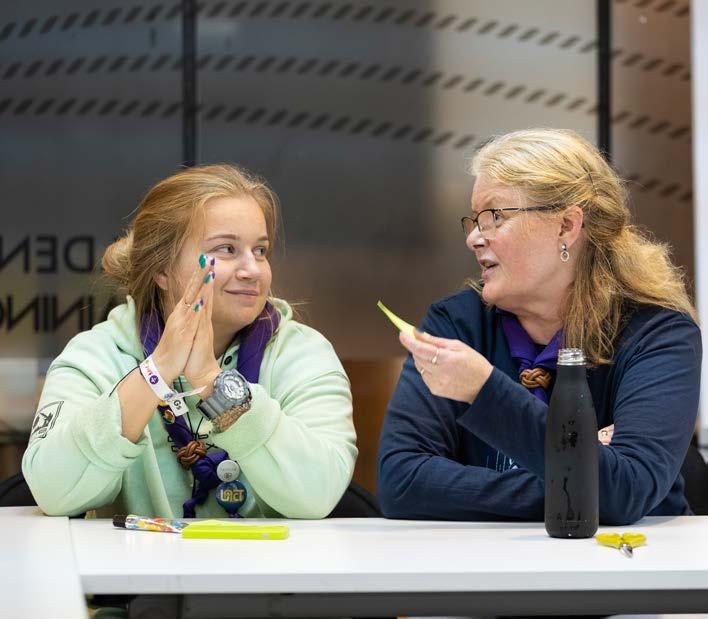
• Based on an operational proposal, on the phasing out of the governance structures of the Eurasia Region.
• T he constitutions committee advised on the institutional process towards phasing out the Eurasia region.
• To phase out, effective 1 October 2023, the operations of the Eurasia Scout Region and its organs: Eurasia Scout Conference, Eurasia Scout Committee, and Eurasia Scout Office.
• A r edrawing of geographical borders.
55 WORLD SCOUT COMMITTEE Midterm Review Report World Triennial Plan 2021 – 2024
World Scout Committee Working Groups
Operational Framework
To date, three support units— the project management unit, the volunteer support team, and the monitoring and evaluation unit — have successfully provided support to all the projects. All three units have a focus on bringing more knowledge and expertise to strengthen WOSM’s project and people management across the delivery of the Triennial Plan.
The project management unit recruited and trained a team of 11 experts who then developed and delivered training sessions on project management and who support individual projects using agile methods. An increased and ongoing focus on stakeholder engagement is helping projects deliver the most valuable outcomes to their beneficiaries. Alongside support for projects, the digital project management system has increased visibility and transparency, leading to increased collaboration and scrutiny between projects. In addition, over 200 deliverables have been seen so far in projects ranging from surveys to members, creation of resources, campaigns, and the delivery of workshops and focus groups.
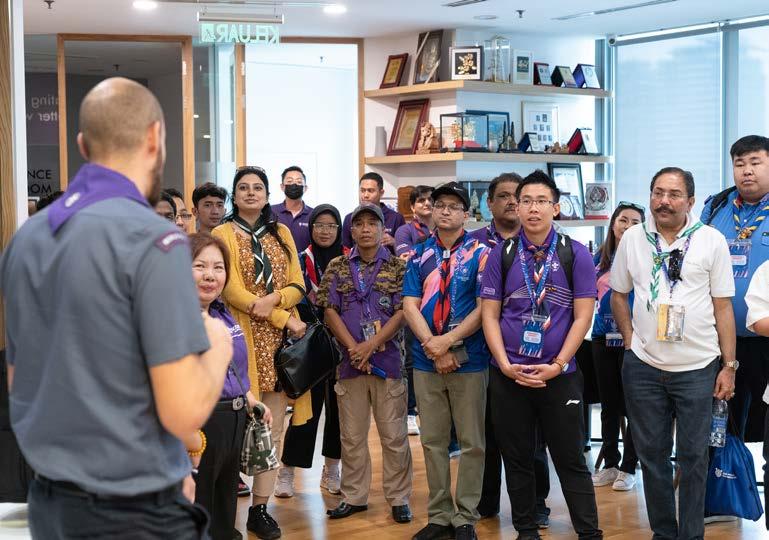
56 WORLD SCOUT COMMITTEE Midterm Review Report World Triennial Plan 2021 – 2024 PROGRESS OF THE 2021-2024 TRIENNIAL PLAN
The volunteer support team is responsible for maintaining and supporting the adult life cycle processes, such as the recruitment and selection of volunteers for projects in the Operational Framework. The team also includes eight team mentors who provide direct support to active projects in the operational framework. Both the mentors and core team have supported the induction process, administration of the volunteers’ induction, and selection, including through the completion of Safe from Harm certifications and mutual agreements. The team helps to facilitate coordination with co-leads to maintain and encourage the well-being of all Operational Framework volunteers and has delivered special recognition events to thank our valuable volunteers and bring people across all project teams together to increase the visibility of their impact. The team also worked with projects in the final stages of the Adults in Scouting process and supported the offboarding of projects and teams as they came to an end. This included the off-boarding of volunteers, the development of a satisfaction exit survey, and a number of improved procedures related to this important stage in our adults’ process.
The monitoring and evaluation support unit consists of four volunteers, a staff member, and a volunteer co-lead. The unit used effective knowledge management approaches to incorporate learnings and monitor key performance indicators for the 2021-2024 Triennium and Vision 2023. The unit designed, implemented, and analysed the NSO baseline survey in 2022 as a key data collection method for measuring the key performance indicators and as a way to contribute to evidencebased decision-making of the World Scout Bureau and the World Scout Committee. During the triennium, the unit used the results of the NSO survey, WOSM Services, GSAT, census data, and other sources across WOSM to provide a detailed status update of the key performance indicators for the World Scout Committee meetings in September 2022 and March 2023, as part of the midterm review of the Triennial Plan. In 2024, the monitoring and evaluation support aims to have launched a NSO survey that will provide the basis for a final update of the key performance indicators and Vision 2023 while capturing lessons for the next triennium.
57 WORLD SCOUT COMMITTEE Midterm Review Report World Triennial Plan 2021 – 2024
World Scout Committee Working Groups
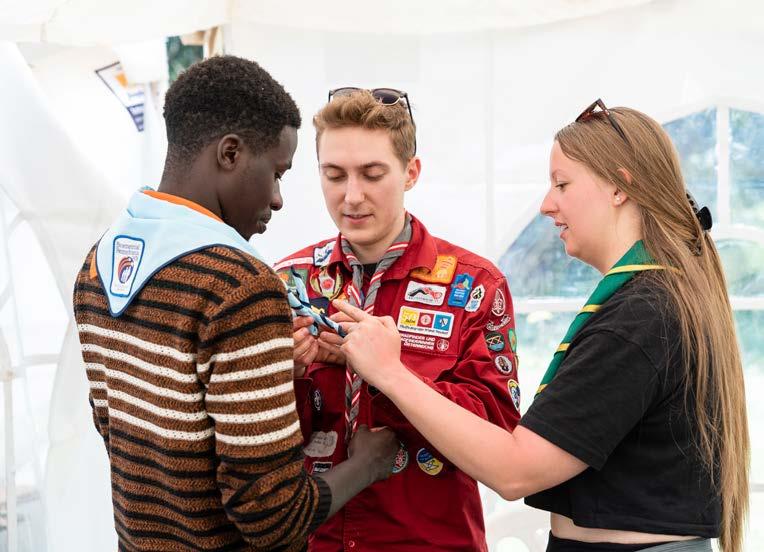
Diversity and Inclusion in the Operational Framework
To ensure the delivery of the World Triennial Plan 2021-2024, 154 volunteers were appointed in the 2021 Operational Framework based on interest, diversity, and expertise to support workstream projects, the World Scout Committee’s standing committees, two WOSM task forces, and the support units of the workstream coordination group for project management, volunteer support, and monitoring and evaluation.
WOSM’s purple team would not be complete without mentioning the more than 200 WOSM consultants who are providing support to NSOs through WOSM Services, 22 Youth Representatives who are engaged to represent the voice of Scouting externally and advocate on specific areas that impact young people, and our growing languages team who support translation and interpretation into the five WOSM languages.
The World Scout Committee aims to strengthen gender balance in its appointments across the operational framework. While we witnessed a decline in the number of female applicants compared to previous trienniums, to date 38% of the volunteer appointees are female and with more appointments upcoming over the triennium, the World Scout Committee will endeavour to achieve full gender balance.
58 WORLD SCOUT COMMITTEE Midterm Review Report World Triennial Plan 2021 – 2024 PROGRESS OF THE 2021-2024 TRIENNIAL PLAN
In line with conference resolutions on youth engagement and the world youth involvement policy, 34% of all volunteer appointments are below the age of 30. With more appointments coming over the triennium, the World Scout Committee aims to achieve that 40% of all appointments are below the age of 30.
Finally, in terms of Regional distribution, while there has been noted progress in achieving greater Regional balance, specifically with consistent growth in appointments from the Arab Region, focus will be made to strengthen engagement from Eurasia and Africa Regions in future appointments.
Gender diversity of appointed volunteers

Trend of ratio of female appointees in the Operational Framework
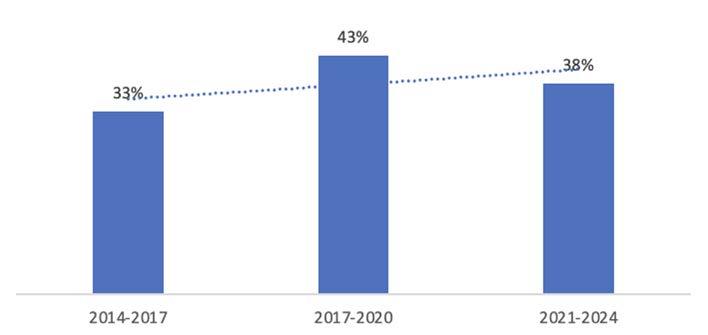
59 WORLD SCOUT COMMITTEE Midterm Review Report World Triennial Plan 2021 – 2024
World Scout Committee Working Groups
Age diversity of appointed volunteers

Regional diversity of appointed volunteers (2017-2020 and 2021-2024)

60 WORLD SCOUT COMMITTEE Midterm Review Report World Triennial Plan 2021 – 2024
OF THE 2021-2024 TRIENNIAL PLAN
PROGRESS

61 WORLD SCOUT COMMITTEE Midterm Review Report World Triennial Plan 2021 – 2024
© World Scout Bureau Inc.
STRATEGY
June 2023
World Scout Bureau
Global Support Centre Kuala Lumpur
Suite 3, Level 17
Menara Sentral Vista
150 Jalan Sultan Abdul Samad Brickfields
50470 Kuala Lumpur, MALAYSIA
Tel.: + 60 3 2276 9000
Fax: + 60 3 2276 9089
worldbureau@scout.org scout.org
© World Scout Bureau
STRATEGY June 2023 World Scout Bureau Global Support Centre Kuala Lumpur Suite 3, Level 17 Menara Sentral Vista 150 Jalan Sultan Abdul Samad Brickfields 50470 Kuala Lumpur, MALAYSIA Tel.: + 60 3 2276 9000 Fax: + 60 3 2276 9089 worldbureau@scout.org scout.org
Inc.







 Ahmad Alhendawi Secretary General, WOSM
Ahmad Alhendawi Secretary General, WOSM





 Dr. Wayne Adrian Davis, Educational Methods Workstream Oversight
Dr. Wayne Adrian Davis, Educational Methods Workstream Oversight








































